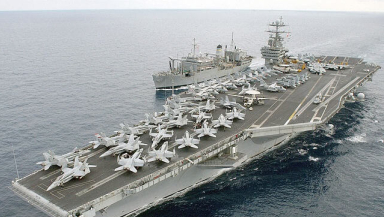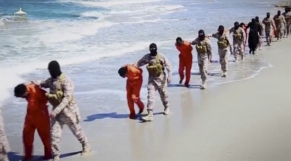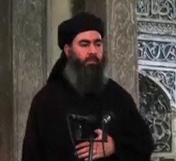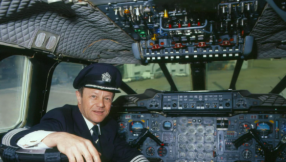
The U.S military on Monday slammed Iran's firing of rockets that landed just 1,500 yards off a U.S. aircraft carrier in the Straits of Hormuz, denouncing the action as "highly provocative."
The USS Harry S. Truman was crossing international waters in the area when Iranian Revolutionary Guards (IRCGN) conducted a live-fire exercise right nearby, according to a statement from the U.S. Central Command, NBC News reported.
The Iranian navy attack craft reportedly fired several unguided rockets near the carrier. A French frigate, the U.S. destroyer USS Bulkeley and other commercial traffic were also in the area at the time of Saturday's incident, the U.S. Central Command said.
"Only 23 seconds warning was given before the weapons were fired," said U.S. Navy Cmdr. Kyle Raines, a spokesman for U.S. Central Command.
"These actions were highly provocative, unsafe and unprofessional and call into question Iran's commitment to the security of a waterway vital to international commerce,'' he said.
Cmdr. Kevin Stephens, spokesman for the U.S. Fifth Fleet, also echoed Raines view in a statement released on Wednesday. "Firing weapons so close to passing coalition ships and commercial traffic within an internationally recognised maritime traffic lane is unsafe, unprofessional, and inconsistent with international maritime law."
The U.S. said the ships were in an "internationally recognised maritime traffic lane'' and not in any country's territorial waters during the time of Iran's naval exercise.
The USS Truman was in the area along with two other warships taking part in the U.S-led coalition against the Islamic State (ISIS). The destroyer USS Bulkeley and a French frigate were reportedly entering the Persian Gulf through the Hormuz Strait at the time of the incident.
The carrier joined the anti-ISIS coalition on Tuesday with the launch of its first mission, the U.S. Navy said.
"Warfighting is the priority; that's why we are here,'' Navy Rear Admiral Bret Batchelder, commander of Carrier Strike Group 8, said in a statement.
"The Truman recently arrived in the Persian Gulf to begin striking ISIS in Iraq and Syria, ending a several-month U.S. carrier gap in the region after the USS Theodore Roosevelt left in October,'' the Hill reported.















